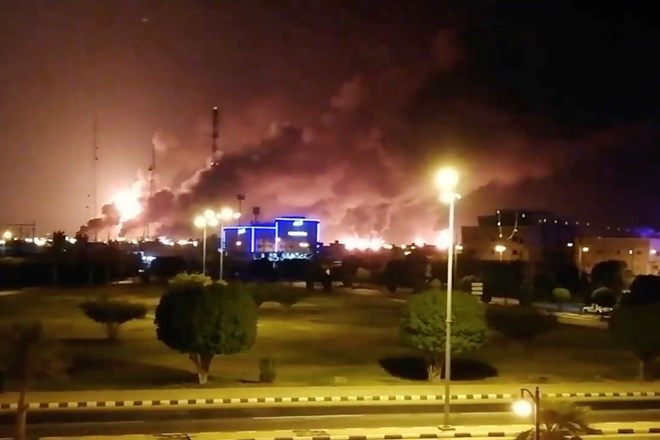Crude prices continued to climb on Monday as concerns mount about supply disruption
Saudi Arabia will not bear any responsibility for shortages in crude supplies to global markets after attacks on its oil sites by the Houthi militia in Yemen, the kingdom said on Monday.
“The kingdom stresses the importance of the international community realising the gravity of Iran’s continued behaviour of equipping the terrorist Houthi militias with the technology of the ballistic missiles, and advanced UAVs [unmanned aerial vehicles] with which they target the kingdom’s production sites of oil, gas and refined products,” a statement from the Foreign Ministry said.
“[This] results in serious consequences for upstream and downstream sectors, affecting the kingdom’s production capability and its ability to fulfil its commitments, undermining without a doubt the security and sustainability of energy supplies to global markets.”
Yemen’s Houthi rebels unleashed one of their most intense barrages of drone and missile strikes on Saudi Arabia’s critical energy plants on Sunday, sparking a fire at one site and temporarily cutting oil production at another.
The Saudi Arabia-led military coalition said Houthis attacked an Aramco liquefied gas plant in the Red Sea port of Yanbu, an oil storage plant in Jeddah, a desalination complex in Al Shuqaiq on the Red Sea coast and an Aramco oil installation in the southern border town of Jazan, among others.
After the attacks, oil prices jumped on Monday as concerns grew over supply disruption.
Brent, the global benchmark for two thirds of the world’s oil, was up 4.6 per cent to $112.90 a barrel at 3.16pm UAE time on Monday, while West Texas Intermediate, the gauge that tracks US crude, was trading 4.65 per cent higher at $109.57 a barrel.
Brent this month touched a 14-year high after climbing to nearly $140 per barrel after the US banned crude exports from Russia due to its military offensive in Ukraine. While prices retreated from those highs, they have started to increase again on supply concerns.
“The prospect of large-scale disruptions to Russian oil production is threatening to create a global oil supply shock. We estimate that from April, 3 millions bpd of Russian oil output could be shut in as sanctions take hold and buyers shun exports,” the International Energy Agency said in its March report.
While Opec+ is sticking to its agreement to increase monthly output by 400,000 bpd from April, “only Saudi Arabia and the UAE hold substantial spare capacity that could immediately help to offset a Russian shortfall”, the IEA said.
Saudi Arabia, the world’s top oil exporter, possesses about 17 per cent of the world’s proven petroleum reserves. It has usually kept more than 1.5 million to 2 million barrels per day of spare capacity on hand for market management, the US Energy Information Administration says.
The kingdom has faced frequent missile and drone assaults by Yemen’s Iran-aligned Houthi group, which has been battling a coalition led by Riyadh for seven years.
The attacks have been focused on energy installations, including the pipelines and storage units of Saudi Aramco, the world’s largest oil-exporting company.
Aramco, which announced on Monday that its annual net profit more than doubled in 2021, said it plans “substantial new investment” to meet demand growth. The company aims to raise crude oil “maximum sustainable capacity” to 13 million barrels per day by 2027 and potentially increase gas production by more than 50 per cent by 2030 as part of its growth strategy.

